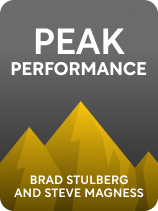
How can stress be good for you? What are ways to take advantage of stress, rather than let it defeat you?
Brad Stulberg and Steve Magness say that a combination of stress and rest is essential for growth, and discuss the optimal way to structure these cycles. We’ll focus on three of their recommendations for incorporating stress.
Check out Stulberg and Magness’s recommendations below.
Strategy #1: Partake in Challenges at the Edge of Your Comfort Zone
Stulberg and Magness argue that challenges that push us out of our comfort zone—without making us lose control—are a crucial type of stress, but they also show how stress can be good for you. According to Mihaly Csikszentmihalyi, these challenges strike a perfect balance between stress that’s too strenuous and stress that’s not strenuous enough. Tasks that are too easy, Stulberg and Magness point out, aren’t challenging enough to stimulate growth, while tasks that are too difficult prevent us from focusing and thus hinder our growth.
(Shortform note: In Flow, Csikszentmihalyi explains that a similar principle applies to the number of stressors that we experience on a daily basis. He writes that when faced with too few challenges, we tend to become complacent and thus stop improving. By contrast, when we’re overwhelmed by too many challenges, we become too anxious to grow from these challenges.)
Strategy #2: Focus Intensely During Stress
Stulberg and Magness report that experiments from behavioral scientist K. Anders Ericsson confirm that intense focus is essential to optimize our training. For instance, in one experiment, Ericsson examined the practice schedules of expert violinists at the Global Music Academy in Berlin. He found that, though all the violinists practiced for roughly the same amount of time, they spent that time differently—the truly elite violinists practiced with singular focus, whereas the more “average” violinists tended to practice inefficiently because of distractions.
(Shortform note: Although Stulberg and Magness focus on Ericsson’s claim that effective stress must be free of distractions, Ericsson himself clarifies that optimal training requires much more than just freedom from distractions. In Peak, he explains that optimal training—which he calls deliberate practice—requires a host of precise conditions. For example, training should involve precise measurement to see whether you’ve met a concrete goal. Moreover, training should include teachers and coaches who can ensure that your training regimen is effective.)
Strategy #3: Use Short Periods of Stress
Stulberg and Magness emphasize that periods of focused training shouldn’t last indefinitely. On the contrary, they argue that stress should occur in short periods lasting around an hour. In addition to Ericsson’s own research, which found that top performers generally work in 60- to 90-minute bursts, Stulberg and Magness cite findings from the Draugiem Group, a social networking company that examined its most successful employees. The group found that on average, its best employees spent 52 minutes working intensely before taking a 17-minute break. In a similar vein, Stulberg and Magness report that the most efficient workers in a meat processing plant worked 51 minutes before taking a 9-minute break.
(Shortform note: Experts explain that one reason why it can be helpful to take breaks of approximately 15 minutes after about an hour of work is psychological: The knowledge that a break is imminent motivates us to work wholeheartedly during that hour. On the other hand, when we work without a definitive end in sight, our motivation is more likely to wane, leading to lower productivity.)

———End of Preview———
Like what you just read? Read the rest of the world's best book summary and analysis of Brad Stulberg and Steve Magness's "Peak Performance" at Shortform.
Here's what you'll find in our full Peak Performance summary:
- That the quest for excellence leaves us suffering from exhaustion and burnout
- Why cycles of stress and rest are necessary for sustainable elite performance
- How to develop a consistent routine and structure your time






